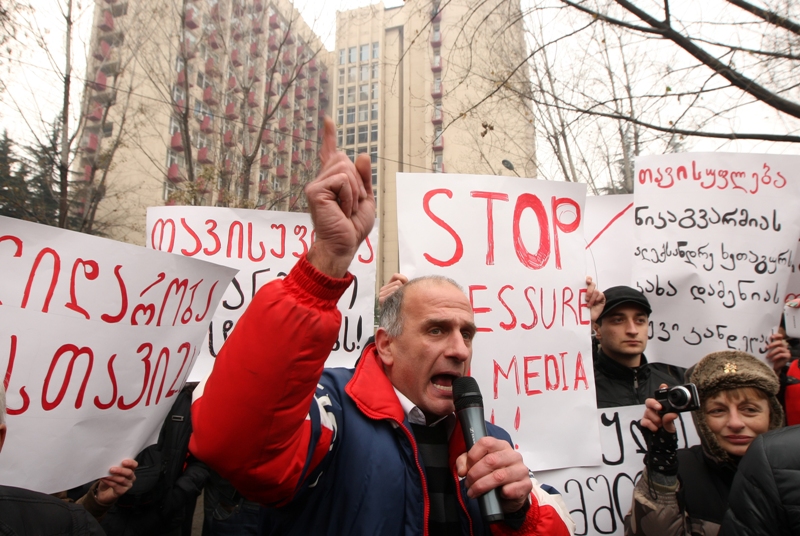The International Press Institute (IPI) today urged Georgian authorities to fully investigate reports that surreptitious eavesdropping that has plagued the country remains ongoing, and not to target media that brought those claims to light.
Prosecutors in Tbilisi last week opened a criminal investigation into the “illegal acquisition and release of private communication” after a May 10 report by Rustavi 2 TV showed that high government officials’ telephone calls were intercepted.
The channel aired portions of the recorded conversations, supporters claim, after prosecutors seemed unwilling to pursue an investigation into Rustavi 2 General Director Nikoloz Gvaramia’s claims that his channel’s offices were illegally monitored.
Gvaramia contends that the recordings show that eavesdropping continued after the now-ruling Georgian Dream party defeated the United National Movement (UNM) at the polls in October 2012. But the current government argues that it did not continue the practice after taking power and that any recent surveillance was conducted by rogue elements using equipment that disappeared on the prior government’s watch.
IPI expressed concern at the accusations and it urged authorities to fully investigate the allegations without compromising journalists’ right to protect confidential sources.
“Allegations that secret eavesdropping is still taking place in Georgia are troubling, but even moreso are the allegations that the news media has been targeted,” IPI Senior Press Freedom Adviser Steven M. Ellis said. “Rather than taking aim at the messenger for broadcasting information that is of public interest – the fact that these recordings exist – authorities need to identify who is making the recordings in a swift, full and transparent investigation that doesn’t trample the media’s right to protect its sources.”
He added: “Given the controversy that eavesdropping has generated in Georgia in recent years, it is imperative that authorities hold those involved in any illegal surveillance accountable and that they do so in a way that sends a clear signal that the independence of the news media must be respected.”
Gvaramia at a May 6 press conference said a source within Georgia’s Interior Ministry revealed to him that the Ministry has “dozens” of recordings containing “business and private conversations of [Rustavi 2] employees” and he showed attendees two video recordings depicting scenes within Rustavi 2’s offices that he said were leaked to him.
The following day, Prime Minister Irakli Garibashvili appeared to accuse the channel of having fabricated the alleged eavesdropping. Members of his party have accused Rustavi 2 of acting as a front for the UNM, which they claim is using “dirty methods” to influence local elections scheduled for June 15.
The chief prosecutor’s office on May 9 released a statement suggesting that its investigation could not proceed unless Gvaramia disclosed his source. The statement also implied that the recordings of conversations at Rustavi 2’s offices were made in 2012 by agents acting on behalf of the previous UNM government.
Gvaramia then held a press conference that afternoon in which he accused prosecutors of fabricating a reason to discontinue their probe and vowed to “turn [their] life into a hell” by exposing other eavesdropping. Rustavi 2 broadcast the recordings of government officials, which did not contain sensitive information, the following day.
The practice of surreptitious recordings has long bedevilled Georgia. Gvaramia – who previously served as Georgia’s justice minister and minister of Education and Science under UNM governments – apologised during the May 6 press conference for harm caused by previous recordings with which he was involved, although he defended those recordings as having been made legally.
If the recently released recordings are shown to have been made by individuals linked to the Interior Ministry under the current government, it would prove embarrassing to Garibashvili. He served as interior minister from Oct. 25, 2012 until he became prime minister on Nov. 20, 2013 as the hand-picked successor to Georgian Dream founder Bidzina Ivanishvili.



